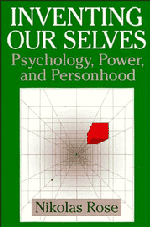Book contents
- Frontmatter
- Contents
- Acknowledgments
- Introduction
- 1 How should one do the history of the self?
- 2 A critical history of psychology
- 3 Psychology as a social science
- 4 Expertise and the techne of psychology
- 5 Psychology as an individualizing technology
- 6 Social psychology as a science of democracy
- 7 Governing enterprising individuals
- 8 Assembling ourselves
- Notes
- Bibliography
- Index
1 - How should one do the history of the self?
Published online by Cambridge University Press: 04 August 2010
- Frontmatter
- Contents
- Acknowledgments
- Introduction
- 1 How should one do the history of the self?
- 2 A critical history of psychology
- 3 Psychology as a social science
- 4 Expertise and the techne of psychology
- 5 Psychology as an individualizing technology
- 6 Social psychology as a science of democracy
- 7 Governing enterprising individuals
- 8 Assembling ourselves
- Notes
- Bibliography
- Index
Summary
The human being is not the eternal basis of human history and human culture but a historical and cultural artifact. This is the message of studies from a variety of disciplines, which have pointed in different ways to the specificity of our modern Western conception of the person. In such societies, it is suggested, the person is construed as a self, a naturally unique and discrete entity, the boundaries of the body enclosing, as if by definition, an inner life of the psyche, in which are inscribed the experiences of an individual biography. But modern Western societies are unusual in construing the person as such a natural locus of beliefs and desires, with inherent capacities, as the self-evident origin of actions and decisions, as a stable phenomenon exhibiting consistency across different contexts and times. They are also unusual in grounding and justifying their apparatuses for the regulation of conduct upon such a conception of the person. For example, it is in terms of this notion of the self that much of our criminal legal systems operate, with their notions of responsibility and intent. Our systems of morality are similarly historically unusual in their valorization of authenticity and their emotivism. No less unusual, historically, are our politics, which place so much emphasis on individual rights, individual choices, and individual freedoms. It is in these societies that psychology has been born as a scientific discipline, as a positive knowledge of the individual and a particular way of speaking the truth about humans and acting upon them.
- Type
- Chapter
- Information
- Inventing our SelvesPsychology, Power, and Personhood, pp. 22 - 40Publisher: Cambridge University PressPrint publication year: 1996
- 10
- Cited by

